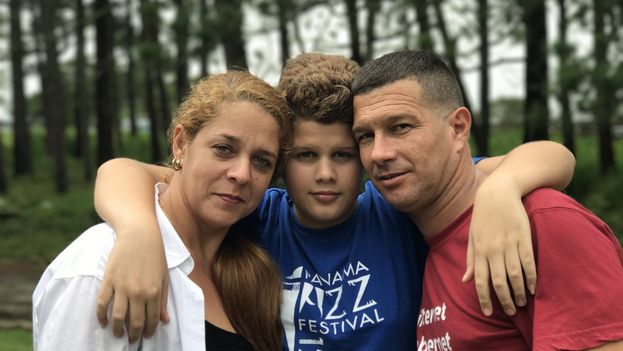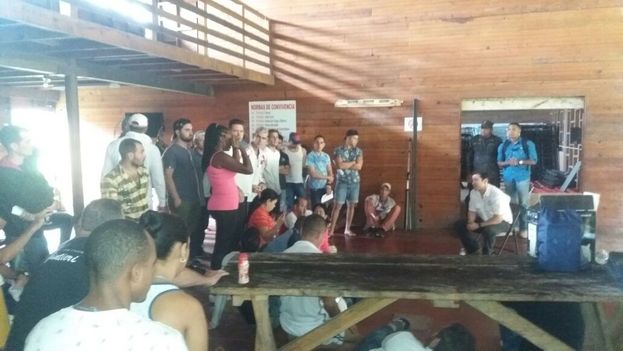
![]() 14ymedio, Mario Penton, Miami, 7 July 2017 – On Friday, Panama’s deputy minister of security, Jonathan del Rosario, offered Cubans stranded at the Gualaca camp $1,650, plus a ticket back to Havana and a multiple-entry visa for Panama, at a meeting to which 14ymedio had access.
14ymedio, Mario Penton, Miami, 7 July 2017 – On Friday, Panama’s deputy minister of security, Jonathan del Rosario, offered Cubans stranded at the Gualaca camp $1,650, plus a ticket back to Havana and a multiple-entry visa for Panama, at a meeting to which 14ymedio had access.
The proposal, which the migrants will have until July 31 to accept, is the response promised by the Panamanian government to solve the crisis caused by the end of the United States’ wet foot/dry foot policy in January, which left Cubans already in Panama stranded.
“This option is a voluntary repatriation process. It is the way to obtain a visa to return to Panama legally and have seed capital to procure a different future for you and your family,” del Rosario told more than 100 Cubans in front of the temporary shelter where they are living.
The economic aid will be delivered at the airport, before the migrants board the flight that takes them to Cuba. Those who do not want to avail themselves of the Panama government’s offer could return to the point where they entered the country, or continue their journey undocumented.
“That’s all they have given us,” Yelisvarys Pargas, a migrant to Gualaca, told 14ymedio, because although the proposal appears good, he distrusts the Cuban authorities.
To attend the meeting, the deputy minister traveled by helicopter to the camp, an area of 104 acres far from any population center in the east of the country. The Panama government had transferred 128 Cubans there in April, after closing a temporary shelter maintained by Caritas in Panama City. Nine migrants escaped from the shelter of Gualaca, which is guarded by the presidential police and Migration and Public Security personnel.
“Panama and Cuba have diplomatic relations, and we have consulted representatives of the consulate and the Cuban embassy in the country about this option,” said the deputy minister.

The Panamanian authorities are also allowing migrants to pre-register for a application for a visa that would allow them, once in Cuba, to get an interview at the Panamanian consulate to obtain a tourist visa. With this visa they will be able to travel to Panama to make purchases for their businesses, according to the deputy minister. For migrants who have been away from Cuba for more than two years and so have lost their right, under Cuban law, to reside in the island, the Panamanian Government would facilitate the process of their return to the country.
Addis Torres, who was with her 13-year-old son and her husband in the shelter was devastated by the news. “I will continue, I cannot return to Cuba at this point. I will continue,” Torres said after the meeting with the deputy minister.
Nirvia Alvarez, another of the migrants said in a voice filled by emotion that Rosario’s proposal left her “on the verge of a heart attack.”
“After six months in this desperate wait and now they come out with this shit. I do not have a house in Cuba, I have nothing, because I sold everything I had. Go back, why? To live under a bridge?” protested the migrant, who is accompanied by her 11-year-old son and her husband.
When asked about the migrants, del Rosario explained that there are no options to emigrate to third countries. “To this day we have had no response from any country,” he explained. Nor did he open the door to regularizing the status of the Cubans in Panama, since the entry of migrants in an undocumented way precludes any kind of formalities for their regularization.
“There are other countries that have different migratory policies, maybe some of you want to return legally to Ecuador, what we can’t do is send you to a third country if we do not have the guarantee that the third country will welcome you,” said del Rosario.
After the presentation of the deputy minister, many of the migrants expressed their doubts about the proposal, arguing that Cuba is not a state of laws and that is why they fled the government of the Island.
Faced with the reluctance of migrants, del Rosario said that so far none of the people who have been returned to Cuba (more than 90 since the signing of the deportation agreement between Cuba and Panama) have filed a complaint at the Panamanian embassy to denounce the violation of their basic rights. “You have free will,” said del Rosario.
